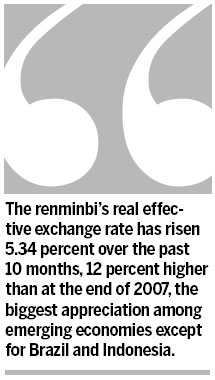Protecting monetary sovereignty
Updated: 2011-11-26 08:00
By Zhang Monan (China Daily)
|
|||||||||

Allegations that the renminbi is undervalued are unfounded because its real effective exchange rate has continued to increase since 2005
The exchange rate of the Chinese currency has been a source of contention in the international arena in recent months, especially since the International Monetary Fund issued a statement in late July stating that the renminbi is undervalued by 3 to 23 percent and the passage of the Currency Exchange Rate Oversight Reform Act of 2011 by the US Senate in October. Brazil is also trying to move a long-running exchange rate war to the World Trade Organization.
However, the assertion that the renminbi is undervalued is completely groundless. It has appreciated 21 percent since 2005 in terms of its real effective exchange rate, which has approached the equilibrium exchange rate level since last year, when the country introduced its most recent exchange rate reforms.
The renminbi's value against the US dollar has exceeded 30 percent since 2005 and nearly 4.6 percent since the onset of this year, and it has risen nearly 40 percent against the dollar since 1994, when China began its foreign exchange reforms. Data from the Bank for International Settlements show that the renminbi's real effective exchange rate has risen 5.34 percent over the past 10 months, 12 percent higher than at the end of 2007, the biggest appreciation among emerging economies except for Brazil and Indonesia.
From a perspective of trade imbalances, China's trade surplus has suffered a considerable decline in recent years, with its proportion to the country's GDP declining steeply since 2009. The country's trade surplus was 3.9 percent to its GDP in 2009 and 3.0 percent in 2010. The proportion declined to 2.8 percent in the first half of this year, far lower than 4 percent, which is an internationally recognized index to measure a country's international payment status. If calculated in US dollars, China's current trade surplus is 45 percent lower than its peak value in 2008. All these indicate that China's international payments are becoming balanced.
Besides, China's expanded overseas investment has reduced the room available to appreciate the renminbi. Due to inconvertibility in its capital account, the large outflow volumes of renminbi assets have increased the risk of the Chinese currency's depreciation. Under these circumstances, any additional appreciation of the renminbi by a large margin would result in its overvaluation.
China's move to internationalize the renminbi will not be easy. As a way to reduce people's expectations for a one-way appreciation of its currency, the country should accelerate the reform of the renminbi's exchange rate formation mechanism, given that the differences of the exchange rate mechanisms at home and abroad mean more risk premium and uncertainties for the renminbi.
The exchange rate issue is in essence an issue of its price setting. Following the adoption of two rounds of quantitative easing by the US Federal Reserve Board, dollar-denominated assets worldwide have continued to flow into China, triggering a passive increase in the supply of the country's base currency. Statistics show that more than 80 percent of China's increased currency supplies are a passive monetary supply increase as the result of its swelling foreign reserves.
Currently, the global foreign exchange system is experiencing radical fluctuations and the sovereign debt crises in developed countries have not been resolved. In this context, the dollar and euro have alternated in their depreciation. In sharp contrast, the currencies of some major creditors in the world have remained basically stable. For example, the Swiss franc, the Japanese yen and the Chinese renminbi are believed by some to be the main currencies for hedging against risks.
However, the renminbi cannot be considered a hedge currency, because excessive appreciation as a result of its being regarded as an investment currency will increase pressures on domestic export-dependent sectors and contribute to a loose domestic monetary environment, which in turn will lead to further price pressure and inflation.
The right to set the price of the renminbi should not be in the hands of other countries. So China should try to increase the renminbi's elasticity, expedite a series of financial reforms, such as reforms of the renminbi's exchange rate formation mechanism, in a bid to safeguard its monetary sovereignty.
The author is an economic analyst with the State Information Center.
(China Daily 11/26/2011 page5)










